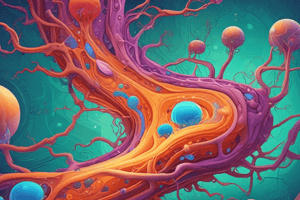Podcast
Questions and Answers
What is the primary direction of molecular movement in passive transport?
What is the primary direction of molecular movement in passive transport?
- From the outside of the cell to the inside of the cell
- From the inside of the cell to the outside of the cell
- From an area of higher concentration to an area of lower concentration (correct)
- From an area of lower concentration to an area of higher concentration
What is the purpose of active transport proteins?
What is the purpose of active transport proteins?
- To assist in the movement of molecules from high to low concentration
- To use energy to pump molecules against their concentration gradient (correct)
- To increase the surface area of the cell
- To regulate the temperature of the cell
What is the term for the random movement of molecules from high to low concentration until equilibrium is reached?
What is the term for the random movement of molecules from high to low concentration until equilibrium is reached?
- Diffusion (correct)
- Active transport
- Osmosis
- Facilitated diffusion
What is the role of the selectively permeable membrane in cellular transport?
What is the role of the selectively permeable membrane in cellular transport?
What is the effect of increased surface area on cellular transport?
What is the effect of increased surface area on cellular transport?
What is the importance of cellular transport in maintaining cellular homeostasis?
What is the importance of cellular transport in maintaining cellular homeostasis?
What is an example of facilitated diffusion in cellular transport?
What is an example of facilitated diffusion in cellular transport?
What is the effect of temperature on cellular transport?
What is the effect of temperature on cellular transport?
What is the role of concentration gradient in cellular transport?
What is the role of concentration gradient in cellular transport?
What is the importance of cellular transport in cellular metabolism?
What is the importance of cellular transport in cellular metabolism?
Flashcards are hidden until you start studying
Study Notes
Cellular Transport
Cellular transport refers to the movement of molecules in and out of cells.
Types of Cellular Transport
- Passive Transport: movement of molecules from an area of higher concentration to an area of lower concentration without the use of energy.
- Diffusion: random movement of molecules from high to low concentration until equilibrium is reached.
- Osmosis: movement of water molecules through a selectively permeable membrane from high to low concentration.
- Facilitated Diffusion: movement of molecules with the assistance of transport proteins.
- Active Transport: movement of molecules from an area of lower concentration to an area of higher concentration using energy.
- Active Transport Proteins: use energy to pump molecules against their concentration gradient.
Factors Affecting Cellular Transport
- Concentration Gradient: movement of molecules from high to low concentration.
- Surface Area: increased surface area allows for faster transport.
- Temperature: increased temperature increases the rate of transport.
- Selectively Permeable Membrane: allows certain molecules to pass through while restricting others.
Importance of Cellular Transport
- Maintains cellular homeostasis and balance.
- Enables nutrient uptake and waste removal.
- Crucial for cellular metabolism and function.
Examples of Cellular Transport
- Glucose uptake in cells using facilitated diffusion.
- Ion pumping in neurons during nerve impulses using active transport.
- Water transport in plant cells using osmosis.
Cellular Transport
Types of Cellular Transport
- Passive transport occurs without energy expenditure, moving molecules from high to low concentration.
- Diffusion is a type of passive transport where molecules move randomly until equilibrium is reached.
- Osmosis is a type of passive transport where water molecules move through a selectively permeable membrane from high to low concentration.
- Facilitated diffusion is a type of passive transport where molecules move with the assistance of transport proteins.
- Active transport occurs with energy expenditure, moving molecules from low to high concentration.
- Active transport proteins use energy to pump molecules against their concentration gradient.
Factors Affecting Cellular Transport
- Concentration gradient influences the movement of molecules from high to low concentration.
- Increased surface area enables faster transport due to a larger area for molecules to pass through.
- Higher temperatures increase the rate of transport by increasing molecular kinetic energy.
- Selectively permeable membranes allow certain molecules to pass through while restricting others.
Importance of Cellular Transport
- Cellular transport maintains cellular homeostasis and balance by regulating the movement of molecules.
- It enables the uptake of essential nutrients and removal of waste products.
- Cellular transport is crucial for cellular metabolism and function, supporting various cellular processes.
Examples of Cellular Transport
- Glucose uptake in cells occurs through facilitated diffusion, allowing cells to obtain energy.
- Ion pumping in neurons during nerve impulses relies on active transport, enabling nerve signal transmission.
- Water transport in plant cells occurs through osmosis, helping to maintain cell turgor pressure.
Studying That Suits You
Use AI to generate personalized quizzes and flashcards to suit your learning preferences.




